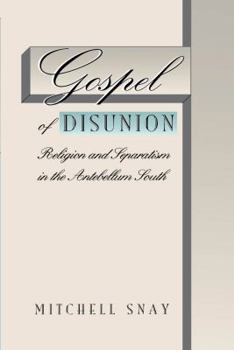Gospel of Disunion: Religion and Separatism in the Antebellum South
Select Format
Select Condition 
Book Overview
The centrality of religion in the life of the Old South, the strongly religious nature of the sectional controversy over slavery, and the close affinity between religion and antebellum American nationalism all point toward the need to explore the role of religion in the development of southern sectionalism. In Gospel of Disunion Mitchell Snay examines the various ways in which religion adapted to and influenced the development of a distinctive southern culture and politics before the Civil War, adding depth and form to the movement that culminated in secession. From the abolitionist crisis of 1835 through the formation of the Confederacy in 1861, Snay shows how religion worked as an active agent in translating the sectional conflict into a struggle of the highest moral significance. At the same time, the slavery controversy sectionalized southern religion, creating separate institutions and driving theology further toward orthodoxy. By establishing a biblical sanction for slavery, developing a slaveholding ethic for Christian masters, and demonstrating the viability of separation from the North through the denominational schisms of the 1830s and 1840s, religion reinforced central elements in southern political culture and contributed to a moral consensus that made secession possible.
Format:Paperback
Language:English
ISBN:0807846872
ISBN13:9780807846872
Release Date:September 1997
Publisher:University of North Carolina Press
Length:280 Pages
Weight:1.95 lbs.
Dimensions:0.8" x 6.5" x 9.1"
Customer Reviews
1 rating
very interesting!
Published by Thriftbooks.com User , 25 years ago
this is one of the first books i've read which has gone off the path in its study of the american civil war, a topic which one might think has had everything written on it. snay's writing is both clear and insightful.






